Updates from inside a maternity wardpublished at 08:27 BST 27 September 2017
Join our reporters as they spend 24 hours inside Ipswich Hospital #BBCmaternity24.
Read MoreLive coverage from inside the maternity ward at Ipswich Hospital
First baby of the day was born just after midnight and is called Tayla
September is the busiest month for England's maternity wards...
Watch the moment Baby Logan was born via C-section
Your maternity questions answered
Join our reporters as they spend 24 hours inside Ipswich Hospital #BBCmaternity24.
Read MoreCaesarean sections are used when a natural birth is considered too risky for the mother and baby.
Read MoreWorking alongside the regular midwifery team, there are three specialist midwives at Ipswich Hospital.
They are:
Appointed a year ago, the midwifery trio are responsible for meeting the often complex needs of new mothers.
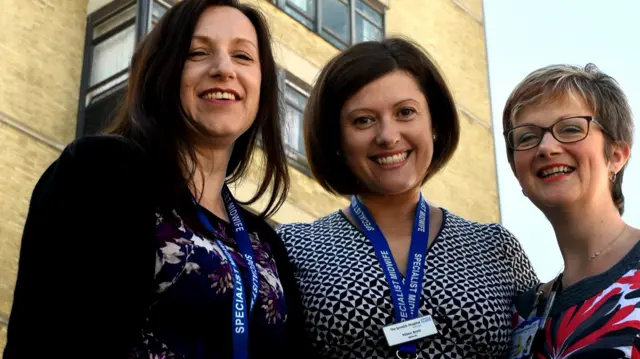 Image source, Ipswich Hospital
Image source, Ipswich Hospital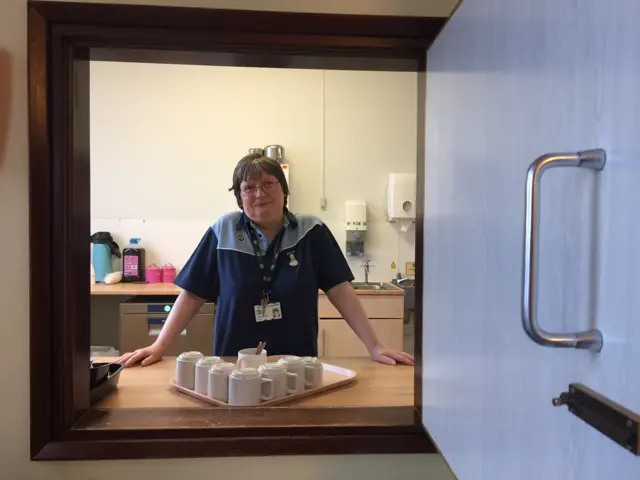
Breakfast is about to be served to the temporary residents of Brook ward.
It's a job Debbie Packard has had the pleasure of doing for the past 10 years, in which time she's tried to provide a bit of comfort to the women who may be feeling a bit jaded.
"I'm serving cornflakes, rice crispies, bran flakes - and they do their own tea and toast," she said.
"They're often a bit shellshocked but I try to take the edge off it."
 Laurence Cawley
Laurence Cawley
BBC News

The sun has now risen over Ipswich Hospital’s landmark 10-floor maternity unit. Inside, the building has just started to come alive, with the smell of toast being made and the sounds of women being up and about after a well-earned rest.
Throughout the day we'll be referring to several different types of delivery - here's a guide to what they are:
Spontaneous
Elected C-section
Emergency C-section
Instrumental
One of the things we're looking at today is Caesarean section births, as figures show the numbers of both elected and emergency C-section deliveries have gone up in the country, despite a fall in the overall number of births.
Rising obesity and older mothers are behind thousands of extra Caesarean births, experts have said.
But what are C-sections? They're when a baby is delivered by making a surgical cut in to the abdomen and womb.
There are two types of Caesarean section. The first is called an elective or planned C-section - these are planned in advance, usually for medical reasons.
The second is an emergency Caesarean, which are carried out at very short notice usually during labour.
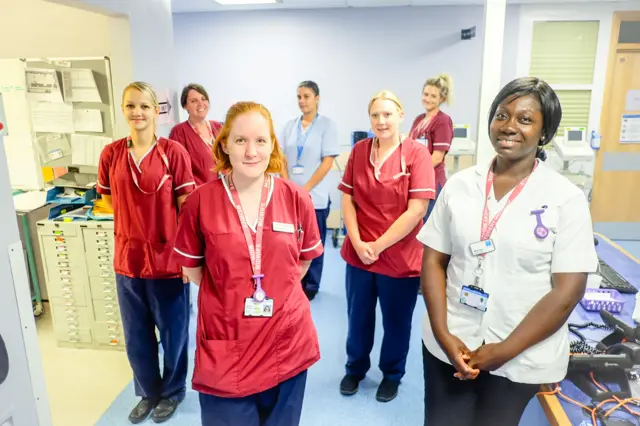
Akos Sey is a student midwife who has delivered 39 babies to date.
She needs 40 deliveries under her belt in order to qualify as a midwife.
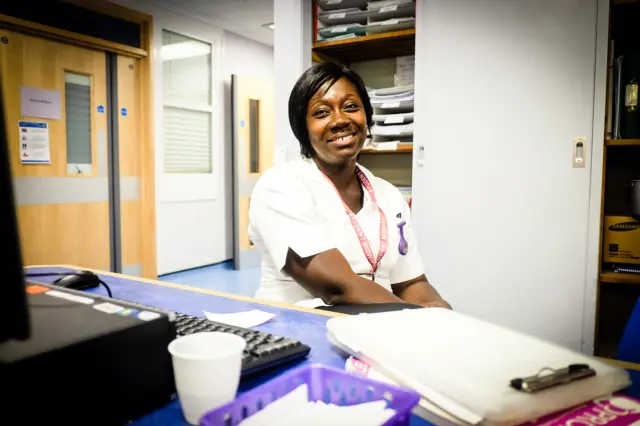
"I have five months of my three-year course to go," said Ms Sey. "I don’t think I will get the 40th this morning, but I might this evening."
 Laurence Cawley
Laurence Cawley
BBC News
There were nine births at Ipswich Hospital yesterday, of which three were by Caesarean.
As for today, well we have already had one birth, a second labour is under way and we have three Caesarean births booked in for the afternoon.
Staff here say they expect between eight and 11 births by day’s end.
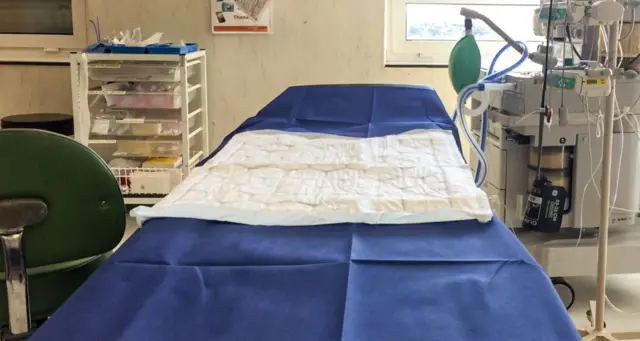
 Laurence Cawley
Laurence Cawley
BBC News
September is the busiest month of the year for maternity wards, says Ipswich Hospital's consultant midwife Helen Smith.
And of all the days in September, the busiest - according to the Office for National Statistics - is 26 September. So, yesterday.
On average it’s the busiest few weeks of the year for births in England and Wales.
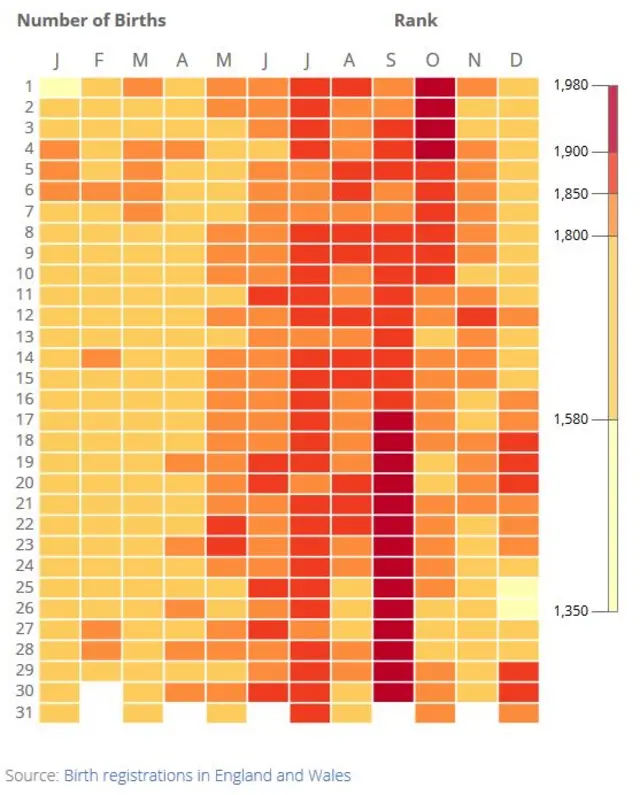 Image source, ONS
Image source, ONSWe asked our England data guru Daniel Wainwright to explain why some months are busier than others.
He told us: "It’s much quieter over Christmas because of all the bank holidays.
"Now, admittedly, no-one chooses when to be born but hospitals will generally only have natural births and emergency C-sections over the Christmas period. Induced births and elective Caesareans will be scheduled on alternative dates.
"1 April is pretty low too, which the ONS speculates could be down to people not electing to have a C-section or induction on that day if they can avoid it.
"As for why September is so busy, well it falls nine months after Christmas.
"So don’t blame it on the sunshine, don’t blame it on the moonlight, but do blame it on the good times and almost certainly blame it on the boogie."
Er, yes, thanks Daniel...BTW, Helen largely agrees with your reasoning.
 Laurence Cawley
Laurence Cawley
BBC News
We've heard a second baby is on its way.
A mother has gone into labour on the Deben ward, which is on the fourth floor of the maternity block.
We'll keep you posted...
The only baby to be born at Ipswich Hospital so far today has been given the name Tayla.
According to figures released last week by the Office for National Statistics (ONS), this was the 1,241st most popular name for girls in England and Wales in 2016.
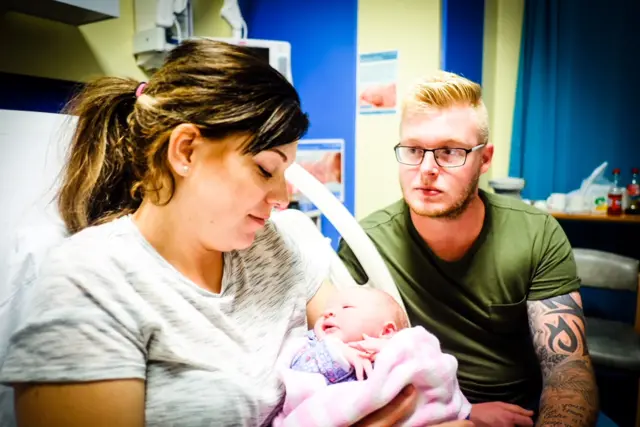
The most popular name for girls was Olivia, while Oliver topped the list for boys.
ONS said 5,017 newborn girls were named Olivia in 2016, replacing Amelia which previously held the top spot.
The East of England followed the national picture.
Here are the top five baby girls' names for the East:
And the top five baby boys' names for the East:
We are just back from the third floor, which is Orwell ward, where most of the mothers and babies are sound asleep, but the staff are wide awake.
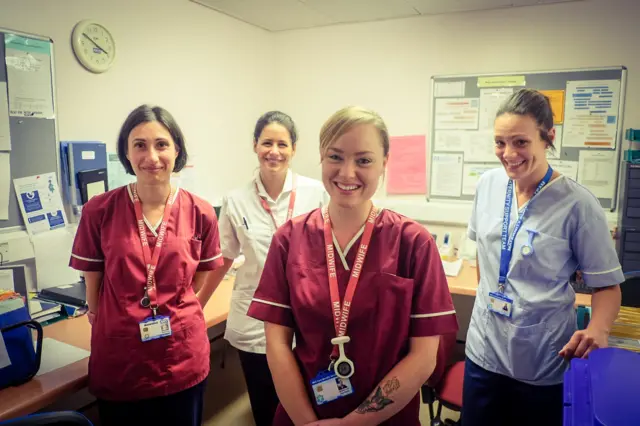
Orwell ward offers post and antenatal care, which at night includes rounds of observations and breastfeeding support.
The ward currently has 13 postnatal mothers, four antenatal mothers and 11 babies.
You might be sensibly wondering why more mothers than babies? The reason is that some of the babies are in the neonatal unit, which is primarily a unit just for babies.
 Laurence Cawley
Laurence Cawley
BBC News
Midwives often get calls from worried mothers on the telephones here.
Clair Barker said the most common concern voiced was about baby movement, or lack thereof.
She said midwives trusted "mother's instinct" in such matters and were always keen to find out what was normal for each person's pregnancy.
Ms Barker said any mothers concerned about their babies should come into the hospital to be checked out.
She also said midwives were becoming increasingly concerned about the availability of doppler ultrasound kits which are sold for use at home.
"Unless you are trained, the heartbeat you pick up might be baby's, it might be yours or you might be listening to the placenta," said Ms Barker. "We would like to see these devices banned."
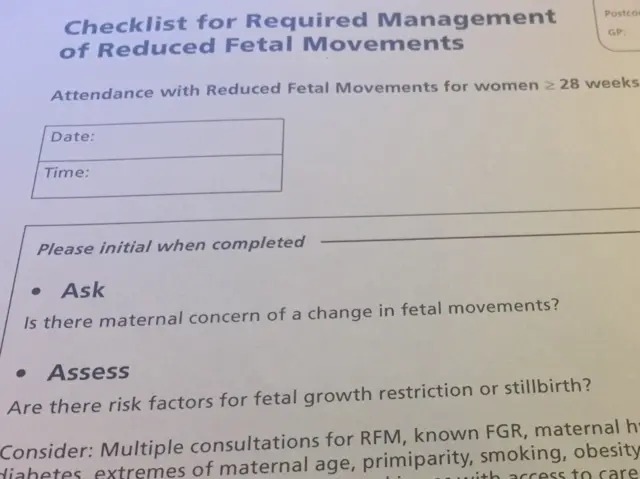
It will come as no surprise that with newborn babies maternity wards are kept really warm.
How warm?
Well, we have taken out a thermometer from a birthing pool and can reveal the ambient temperature here is 24C (75F).
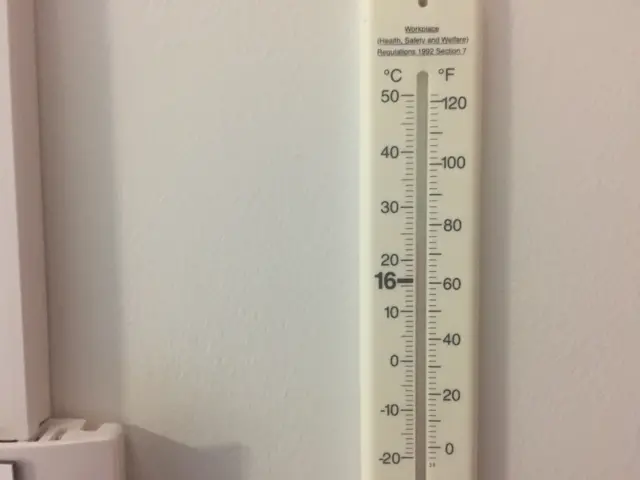
That’s the same temperature as the weather forecasters are expecting in Cyprus at 09:00.
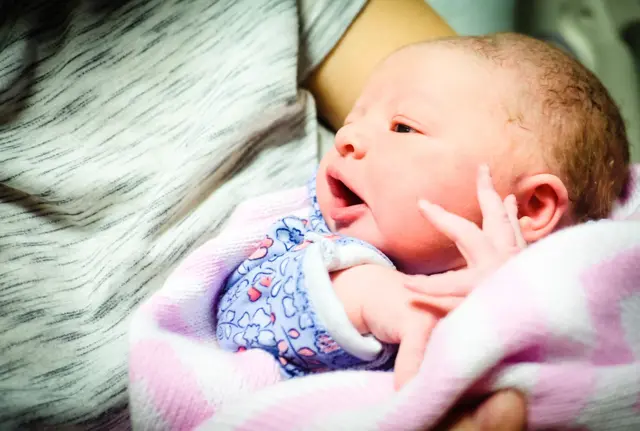
At 00:14 this morning, Sophie and Nathan got to say hello to their daughter, Tayla.
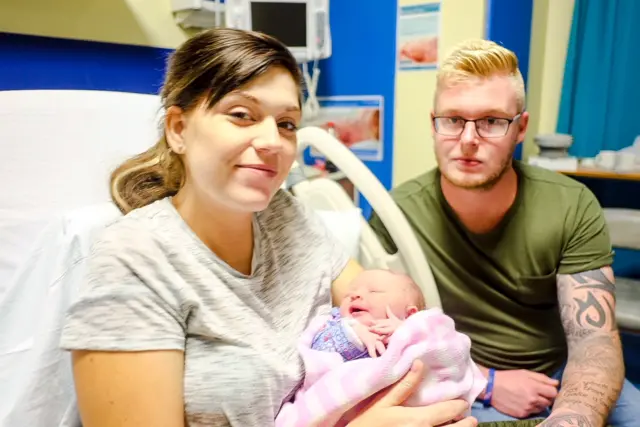
Sophie was due to give birth on 8 October, but came to the hospital yesterday morning and was induced at about 21:00.
"It all happened so quickly," Sophie told us. "We'd been through a lot with the pregnancy but it's all worth it now."
Tayla weighed 6lb 15oz and is Nathan's first child.
"It was better than I thought it was going to be," he said of the experience. "It's overwhelming."
In Deben ward there's a second mention of the night, while I'm in earshot at least, of there being a ban on 'the q word'.
The ward is surprisingly quiet, though, in terms of actual noise - with little footfall in the corridors and just a faint sound of a baby crying coming from one of the closed off rooms.
The baby pictured below, Rory, was born yesterday and has come for a cuddle with midwife Kelly Sagnella.
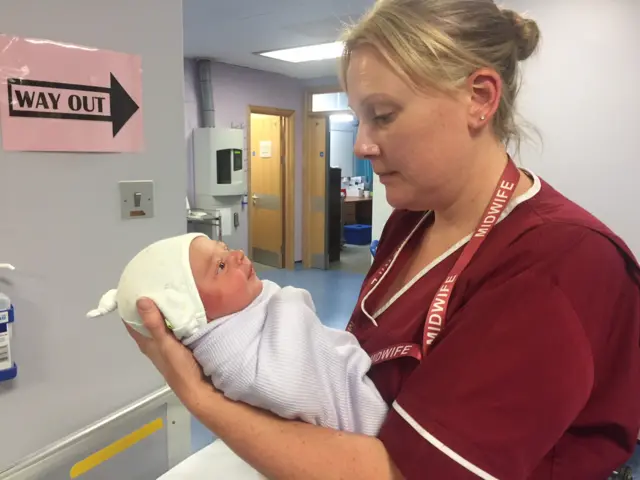
It gives Rory's mother a few minutes' rest, and provides Kelly with what she says is one of the perks of the jobs - getting to know the newborns.
 Laurence Cawley
Laurence Cawley
BBC News
We have just joined midwife Clair Barker and maternity care assistant Jenna Buckley as they carried out the checks on the resuscitation equipment.
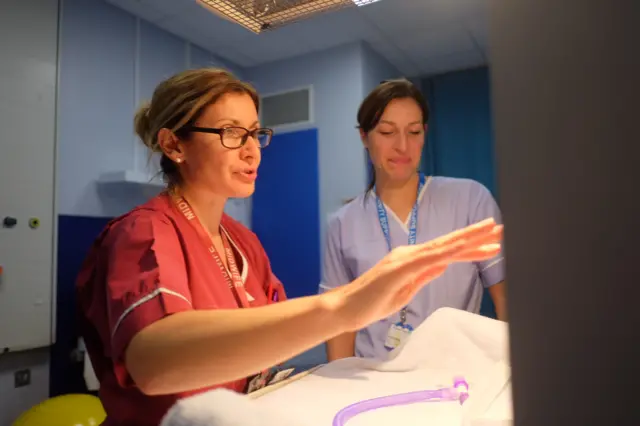
These checks on the ‘resuscitars’ are carried out daily and involve checking the pressure and air flow.
These devices also have a switch to gently warm the mattress upon which a baby might be placed.
The first baby of the day has been born at Ipswich Hospital. We’ve just been told a girl was delivered at 00:14... and we might get to meet her shortly.
 Richard Haugh
Richard Haugh
BBC News
As mentioned earlier, the maternity wards are housed in a concrete tower block that dominates the local skyline - in the east of Ipswich.
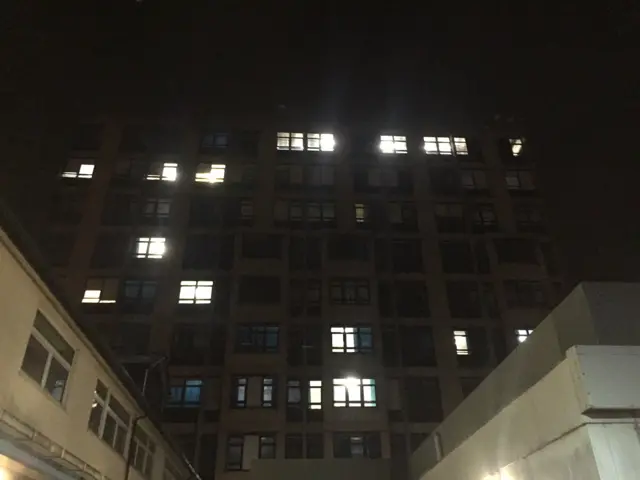
We're currently based on the second floor, in a temporary office in the day room of Brook Ward. This, the ward not the day room, is where mothers who are expecting what could be termed as a spontaneous/straight-foward/uncomplicated delivery would come.
One floor up is Orwell, an antenatal and postnatal consultant-led ward, and on level four is Deben - a consultant-led delivery suite.
We're yet to go there tonight, but on the eighth floor are the Blyth theatres - where the planned Caesarean section births will resume later this morning.